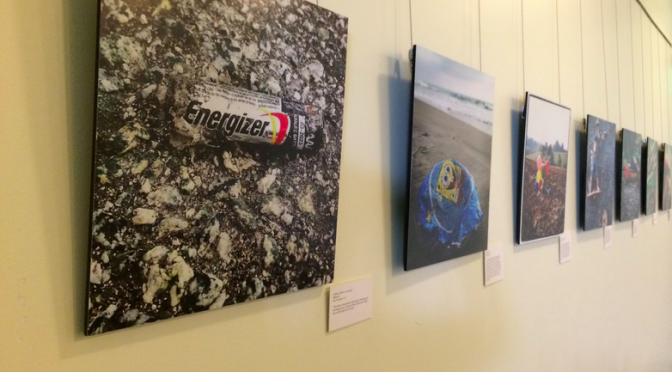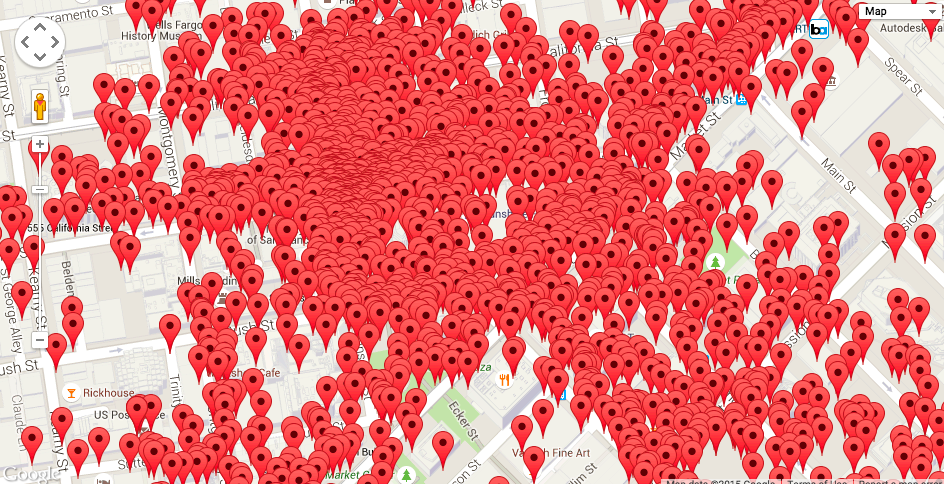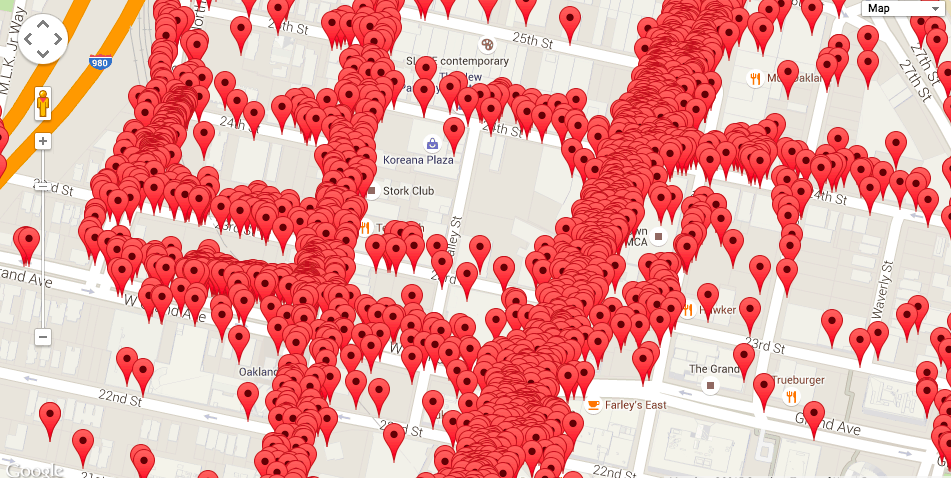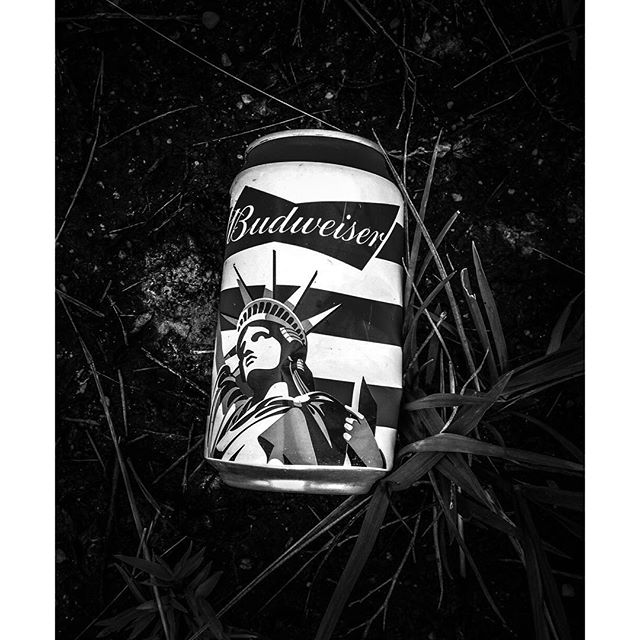David Smooke: Hello and welcome to David Walks. I’m here on the corner of Bush and Montgomery with my friend Jeff of Litterati.
Jeff Kirschner: Hi David.
David Smooke: Good to have you here.
Jeff Kirschner: Likewise. Can I just say David Walks is such a great name? I didn’t really think about it until just now. Just a simple …
David Smooke: Yeah. My name’s David and …
Jeff Kirschner: I walk.
David Smooke: … I walk places …
Jeff Kirschner: Good.
David Smooke: …And record the conversations.
Jeff Kirschner: Nobody’s going to have any trouble understanding exactly what you do.
David Smooke: Tell me about Litterati.
Jeff Kirschner: We have a vision to create a litter-free planet, and …
David Smooke: Very admirable.
Jeff Kirschner: Thank you. It all started on a walk in the woods with my two little kids. My four year old daughter said she had noticed a plastic tub of cat litter in a creek. Pretty gross. She looked at me. She goes, “Daddy, that doesn’t go there.” I know this sounds like a cliché, but that honestly was the eye opening moment for me. I’ve lived in the Bay Area for 20 years. This place that prides itself on being ecologically responsible, and environmentally progressive, yet everywhere you look there’s trash.
When my daughter said that to me it reminded me of when I was a kid growing up. I used to go to summer camp in upstate New York, and on the morning of visiting day before they’d let our parents in our camp director would say, “Quick, everybody. I want you to all go out and pick up five pieces of trash.” Essentially at 200 kids each pickin’ up five pieces within ten minutes we had a much cleaner camp. We were basically crowd-source cleaning the camp long before that term meant anything to anybody. My idea was why can’t we apply that model to the whole planet? That was the inspiration for starting Litterati.
David Smooke: Sweet. Take a picture of that litter right there?
Jeff Kirschner: Sure.
David Smooke: What do we got? We got a coffee cup …
Jeff Kirschner: We got several things within a ten inch radius.
David Smooke: That’s a good shot.
Jeff Kirschner: Parliament cigarette, Marlboro cigarette, Styrofoam … Some sort of coffee cup.
David Smooke: It says enjoy your coffee. Pretty dirty. Say here’s something around here works. Do you frame the shot?
Jeff Kirschner: Sometimes. It honestly depends. On a litter-walk, and I’m picking up 150 things …
David Smooke: No.
Jeff Kirschner: No. If I am doin’ somethin’ like right now to look a little nice then yeah.
David Smooke: I kind of like the idea of glorifying … Not … I mean it’s a little bit of glorifying. That’s not quite the right verb, but it’s whatever. It’s like, “Hey. If you make this piece of trash a good picture now does that mean more people in the future will pick up trash?”
Jeff Kirschner: It’s interesting you should … Let me tell you what I just did. The way Litterati works today is we built it all on top of Instagram.
David Smooke: Good idea.
Jeff Kirschner: Thanks. It was not by design. I’d love to tell you that it was but it wasn’t.
David Smooke: I played around a little with photos and geo-location. It’s just so much to build. The more you can just be on top of someone else in terms of leveraging their tech for good it’s a good way to live.
David Smooke: It’s a great way to test.
Jeff Kirschner: Which is exactly what we’ve done. The way Litterati works is you find a piece of litter, you photograph it with Instagram, you add the hashtag #litterati, and whatever you’re picking up … coffee cup like we just did …. Starbucks, Pepsi, bottle cap, Coke whatever, and then you throw out or recycle the litter. It’s literally that simple. What’s interesting is that through that process we’re actually capturing a huge amount of data.
An easy way to think about (Litterati) is who, what, where, and when. We’re able to understand just from the photograph who picked up what, what brand, what product, where because every photo’s geo-tagged, and when because every photo has a time-stamp. Our belief is that we can do a lot with that data to become smarter about a problem that frankly plagues the entire planet. In a way that can lead us towards data driven solutions. Rather than just picking it up week, after week, after week, and nothing ever changes. It’s like … What’s that old definition of insanity? Doing the same thing over and over, and expecting a different result? That’s essentially what we’ve been doing with litter.
David Smooke: That’s a good definition of insanity. Tell me a little more about the name. How did it arise? It has litter in it, but you also have the ending. What is it … What’s the take away from the name? Is it … It is one thing that I was … That struck me from afar before we met. It’s like Hey, just on a very simple level there’s 135,000 pictures that have used this hashtag. That’s like … It’s like a … There is a nice brand quality behind it, but I wanted to talk to you a little bit about the story behind the name.
Jeff Kirschner: It’s interesting you brought that up. Right now the Litterati community … Let me give you some framework. When I took that walk with my kids I came across a cigarette butt, and I took a photograph using Instagram just because. It just happened to be there, right?
David Smooke: You don’t have to go far in the city for that. Cigarette butts per block. That could be an interesting way to judge …
Jeff Kirschner: We have …
David Smooke: … Real estate value.
Jeff Kirschner: We have …
David Smooke: Do real estate value versus cigarette butts per block.
Jeff Kirschner: That’s a really interesting idea.
David Smooke: That’d be a good data one.
Jeff Kirschner: One of the … As we build out our platform we’re looking to create an API that allow other data sets such as real estate value, or …
David Smooke: I’m takin’ a picture.
Jeff Kirschner: Good catch. [inaudible 00:05:51]
David Smooke: [crosstalk 00:05:54] A Very scenic city. Everyone wants to take a picture here, so we got to clean up the litter.
Jeff Kirschner: Cool. The pride alone of how we treat our environment. Anyway I took a picture of this cigarette butt, and I took another picture, and another picture, and another one. I noticed two things happening to me. I was never an active environmentalist, and I’m certainly not a good photographer, but the first thing that I noticed was Instagram made litter really approachable. It went from being this blight on the ground that I either didn’t notice, or worse didn’t want anything to do with to, “Oh, that’s a cool photo opportunity.”
The second thing that happened … In fact the thing that was much more impactful was after a couple of days I had … I looked at my camera roll on my iPhone, and I noticed that I had taken 20 or 30 photos, and I had picked up, and thrown out, or recycled every single piece that I had photographed. I realized that I was effectively keeping a record of the impact I was having on the planet. I had no clue what I could do with that information. I just thought it was cool.
David Smooke: Once you take a picture then it’s like, “I have to pick it up,” for sure. [crosstalk 00:07:14] There’s a … Definitely that behavior much more so than look at it for a moment, and then you think about it for a very short moment, then you take your next step.
Jeff Kirschner: Exactly. If you’ve already stopped for a picture, it’s like, “Now that I’ve stopped, and I looked at it, what is this? How do I make it better?” Right. It enforces the decision a little bit. It does and it almost brings you closer in a way to your own environment.
I didn’t know what I could do with this information, but I knew intuitively that it translated into some sort of quantifiable good. That’s 20 less pieces that you might see, or she might slip on, or some animal might digest. I just started tellin’ people what I was doing, and what started out as one cigarette butt has now become … Today I think we’re crossed over 143,000 pieces in 50 countries.
David Smooke: Wow.
Jeff Kirschner: This community has been boring, and everybody’s contributing to the same common, greater goal.
David Smooke: [Wild 00:08:18] Back to the brand name.
Jeff Kirschner: Right, I’m sorry. I just …
David Smooke: How did it come about?
Jeff Kirschner: I used to teach … I’m a writer by trade.
David Smooke: Me too.
Jeff Kirschner: [inaudible 00:08:28] I used to teach a class on story. I had this experience in the woods with my kids, and came up with this idea for Litterati. I brought it to my class and I was like, “Hey. What do you guys think about this?”
David Smooke: That’s the focus group?
Jeff Kirschner: Exactly. Exactly the focus group. It was a bunch of creatives. One of the students was … I had horrible names. I hadn’t come up with the name Litterati yet. I had horrible names like Litter Camera. Exactly. Trash 101. Terrible. Just terrible. One of my students was like, “What about [Litterazzi 00:09:15]. You got the camera, you got litter.” Then another student was like, “I don’t know that makes me think of the Nazis.” I was like, “We’re definitely not doin’ that.” Then a third student said, “What about Litterati?”, and it just stuck. It’s been … I think it’s been a good brand identity from day one.
David Smooke: Were many people using the hashtag before you started using it?
Jeff Kirschner: To be honest I hadn’t done … I haven’t done the research, but our data would suggest that no. If you look into …
David Smooke: I mean that would be an off the cuff type of use as opposed to before the movement, essentially.
Jeff Kirschner: Exactly. That’s a good way of putting it. I think it would be people who misspelled the traditional literati like those involved in books, and authors, and reading, but no not really. I think that’s part of one of the reasons it spread is that people were noticing … Instagram’s got what 350 million people?
David Smooke: I think, yeah. At least. I know. Yeah.
Jeff Kirschner: People were seeing this random word on all sorts of photos. A snickers bar, a plastic lid, a Burger King cup, and starting wondering, “What is this random word that keeps surfacing on different types of photos?” When you think about that we’ve been very lucky. We’ve gotten a bunch of press, and I’ve been speaking, and then people just starting to do it. This word just keeps surfacing, and that’s one of the reasons why Instagram has been such a great platform to essentially test a minimum viable product. I had no idea if we could convince anybody to pick up anything. Before I …
David Smooke: Let alone hundreds of thousands.
Jeff Kirschner: Yeah. Before pouring time and resources into it, it was a great way to really leverage something that had already been built, and see if we could pull out what was valuable about it.
David Smooke: The story itself, the eureka moment … I don’t have any kids so I don’t fully understand it, but it does remind me of a story my mom told me about my dad. It’s essentially going to the store with my older sister, and she points to the cigarettes, and she’s like, “Those are for Dad,” and that was the moment my Dad quit cigarettes. It’s kind of like, “Yeah. I’ve been seeing this my whole life, but suddenly my daughter says it, and it’s like wait a minute. [crosstalk 00:11:52]. How am I tolerating that?”
Jeff Kirschner: You can. That … I think you articulated what happened to me. I [inaudible 00:11:59] ask you. We’re in …
David Smooke: Nob Hill.
Jeff Kirschner: Right?
David Smooke: Yeah.
Jeff Kirschner: Pretty nice place in San Francisco.
David Smooke: Yeah. Really [inaudible 00:12:05] homes.
Jeff Kirschner: Just take a look, okay?
David Smooke: Wow, this is like a little corner. This is like they made a makeshift trashcan here. It’s almost like should there be a trash can here?
Jeff Kirschner: You would think.
David Smooke: This little corner.
Jeff Kirschner: If we walk … Just watch this. We’re going to walk … what 20 feet maybe? 25 feet? Just see if you … Just start counting, and see if you can …
David Smooke: This bed of plants is really getting hit.
Jeff Kirschner: Check out this bed. What’s interesting to me almost from an archaeological perspective is this will tell us about the people that are in this area. It can tell us about the stores and commercial operations that are in this area.
David Smooke: People still using plastic bags even though it’s illegal here. [crosstalk 00:12:50] What type of cigarettes are made.
Jeff Kirschner: What type of cigarettes are most often smoked?
David Smooke: One shots versus full bottles of liquor. Chipotle might be nearby.
Jeff Kirschner: Somebody clearly had a cough. [crosstalk 00:13:03]
David Smooke: What a lemon, huh? Starbucks, Marlboro.
Jeff Kirschner: Right here, two of the most commonly found brands, [crosstalk 00:13:14] Community, Marlboro Number One, Wrigley’s is probably nine or ten right now.
David Smooke: Starbucks was on the list I saw.
Most commonly found #litterati: 1. #Plastic 2. #Paper 3. #Cigarettes 4. #Can (source = @litterati) pic.twitter.com/DUzs2kl8KC
— David Smooke (@DavidSmooke) July 12, 2015
Jeff Kirschner: Yeah.
David Smooke: Menthol that we saw back there probably called Newports.
Jeff Kirschner: Yeah. Newport’s probably number five for us. By the way, two things that I find really fascinating. One is this is just what we can see. There is so much that over time has just gotten lower to the ground covered with debris and leaves. Things like that. Number two is every city has a litter profile. San Francisco has one, Oakland has one, Tokyo has one. They don’t know what they are, but they all have them. A litter profile is essentially the what, the where, and the when of litter. Understanding what you’re finding on the ground, what are the most commonly found products or brands, where you’re finding them, and you can imagine like in San Francisco the litter you find in the [Castro 00:14:10] is different than the litter you find in Chinatown, is different than the litter you find in Pacific Heights, is different than Noe Valley.  Then the when … You know what we saw a ton of the first week in November? Candy wrappers because of Halloween. This past week we saw a ton of patriotic stuff, because [crosstalk 00:14:29] July 4th. Our belief is that …
Then the when … You know what we saw a ton of the first week in November? Candy wrappers because of Halloween. This past week we saw a ton of patriotic stuff, because [crosstalk 00:14:29] July 4th. Our belief is that …
David Smooke: You go there after the Chinese New Year in China Town … So much … The firework remains are crazy.
Jeff Kirschner: Everywhere [crosstalk 00:14:38].
David Smooke: The whole street is completely filled.
Jeff Kirschner: Everywhere. When the warriors won the title there was so … there’s still … It’s been … I think the parade was … I think it’ll be four weeks ago …
David Smooke: At least three.
Jeff Kirschner: … This Friday. Maybe three, whatever. Call it a reasonable amount of time.
David Smooke: You call it.
Jeff Kirschner: If you go to downtown Oakland right now, and we’ve got the data to show it, there’s blue and yellow confetti still everywhere. What happens is it gets caught. It gets caught in storm drains, or it gets caught in tree beds, or in the bushes. Our belief is that this is a global pandemic, and strangely one that has virtually no information. The only information that exists today is … lacks specificity, it provides little to no insight, and it’s collected with pencils and clipboards. If we can provide a solution that can offer a much richer level of analytics, so that we can be more informed and insightful about the problem, we could actually come up with solutions based on some intelligence, rather than just [inaudible 00:15:54] pick it up again. That’s the idea behind Litterati.
David Smooke: Small [use 00:16:00] case example that’s coming off the top of my head. It’s … If Starbucks is considering opening the next … Taking the next place that’s open for rent – it’s like wait a minute – If Starbucks has a larger cost than the local community, because it produces more litter, should that means it has to pay more to rent that location?
Jeff Kirschner: Great.
David Smooke: That one’s where it’s like Hey, you reward businesses that produce less externalities on local society. The other thing I was thinking about on the walk to come meet you today. It’s kind of like looking at … The time-stamp and the location they’re very accurate. Whenever tagging the brand names they’re accurate if the person decides to do it.
Jeff Kirschner: Exactly.
David Smooke: It’s not facial recognition, but if you have Google images and you drop an image in, and a lot of times it recognizes that the word is Marlboro. I’m sure that you’ve thought about this problem, and I don’t want to have you give away anything that’s in secret, but where do you see how much can you make … identify what the image is, and add the tags on it’s own?
Jeff Kirschner: Quite a bit. We’re starting to do that now. Instagram … Wonderful platform for us to test. Clearly not the right platform from a long-term perspective. There are things we want to do both from the data-analysis side, and probably more importantly from the data collection side that really require us to build our own application.
David Smooke: I would just be wary of … It’s so easy for people to upload photos to Instagram. You don’t want to lose all that movement.
Jeff Kirschner: You’re right. You’re absolutely right.
David Smooke: Instagram’s always going to be important to your long-term growth.
Jeff Kirschner: We will never shut that off. Frankly, if people are contributing by taking one beautifully artistic photo once a month, or somebody’s picking up 50 things a day, and the Litterati community has both those types of individuals, our belief is: Great, whatever you want to do that contributes to this greater good that’s awesome. One of the things we’ve heard is Litterati has started serving as this unifying umbrella. Traditionally if you picked up a bottle cap in Seattle, and I picked up one in Sydney those were isolated, quiet acts, right?
David Smooke: Yeah.
Jeff Kirschner: I don’t know you exist. You don’t know I exist. That can feel daunting. It’s like, “What difference can I possibly make here in Sydney?”
David Smooke: I love it from an inbound marketing perspective. It’s just like, “Hey, what I’m doin’ is just naturally going to attract people that are also doing it.” It’s very much speaking to why you would post the status update on anything.
Jeff Kirschner: Exactly.
David Smooke: Why would you post any public information. It’s ultimately to meet other people that are doing similar things. Jeff Kirschner: We are social beings, right?
David Smooke: Yeah.
Jeff Kirschner: By you picking it now, if you pick up one in Seattle, I pick up something in Sydney, Litterati makes that act social and share-able. I know you exist. You know I exist.
David Smooke: What’s up?
Jeff Kirschner: We know … Exactly. We’re not in it alone. There’s thousands of other people around the world doing the same thing, and that’s empowering. That makes it feel like, “You know what? We can solve a global problem. It’s going to take a village, but I’m not alone.” It’s that same thing like people who don’t believe that their vote makes a difference. It absolutely does, but people feel overwhelmed.
David Smooke: You talked about where the village is at now you mentioned some people are taking 50 multiple pictures a day?
Jeff Kirschner: Yeah.
David Smooke: How many of these … How do you look at who is a power user, or power member of the community, and how many of these really dedicated people do you have?
Jeff Kirschner: We haven’t done any analysis on x person took y amount of photographs, and that defines a power user. I think for …
David Smooke: I think that would be a great page [crosstalk 00:19:59] site. We’re looking at who’s doing it a lot. It’s warning those people, and having them build communities around them. Jeff Kirschner: Totally.
David Smooke: That’ll really take another step.
Jeff Kirschner: You’re hitting the nail on the head. We actually have this whole Litterati Leaderboard. We haven’t published it …
David Smooke: Really?
Jeff Kirschner: … We have all the data. David Smooke: You already have it? That’s great.
Jeff Kirschner: Yeah, because we know … Back to the who, what, where, and when. We know who’s picked up what, where, right? It’s interesting. There’s certainly an … Actually that might not be true. There’s maybe, there might be an opportunity for [gamification 00:20:33] adding external motivations to Litterati. Pick up ten things you get a digital badge, or you get a …
David Smooke: You don’t want to make it corny. You don’t want to make it corny. You want to get … Incentivize people, but it’s also … It’s already incentivized people naturally. Which is much more appealing. 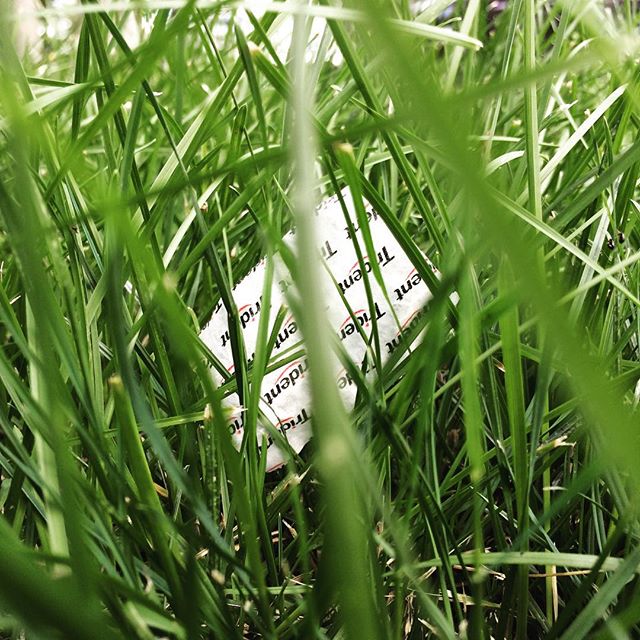
Jeff Kirschner: It’s also in my belief a much more strategic long-term goal, because the external rewards are maybe a great way to jump-start people and get them going, but it’s the intrinsic reward you feel for [playing 00:21:09] a greater good for the planet that is really going to keep you going. It’s like this … There’s a great book called Drive, by Daniel Pink where I got this idea, and I firmly agree with his thought, which is if you’ve got a ten year old son, and you pay your son five dollars to take out the trash every week that’s his reward. Two things are going to happen. One, you’re always going to pay him five dollars to take out the trash, and two after a while five bucks isn’t enough anymore. Then suddenly the action …
David Smooke: Inflation …
Jeff Kirschner: Yeah.
David Smooke: You got to save up for college.
Jeff Kirschner: With Litterati how do you continually make sure that the action itself is the reward? Once the reward isn’t worth it to somebody you’ve lost them.
David Smooke: That’s a great learning. Are you writing any longer form … The video’s great that you have on your site. The digital … What do you call the digital … Digital trash bin?
Jeff Kirschner: Digital landfill.
David Smooke: Digital landfill. That’s a good name.
Jeff Kirschner: That was another name a student came up with.
David Smooke: Yeah?
Jeff Kirschner: Yeah.
David Smooke: Man, look at you. Talking to your students. The student becomes the master, or master learns from the student? J
eff Kirschner: I hope so.
David Smooke: Builds website.
Jeff Kirschner: I …
David Smooke: Creates movement to eradicate litter from the world.
Jeff Kirschner: There’s a great quote from the Venture Capital from Benchmark Capital, who I have the utmost respect for. They talked about meeting people who are learn-it-alls. I certainly don’t know …
David Smooke: That’s a great phrase.
Jeff Kirschner: Yeah. I want to be a learn-it-all. This is an area that I had no experience, no knowledge of before getting into it. The more that I can learn from the community, the team, the better off. I’m just the guy at the front of the line tellin’ the story. You had that great idea about property values and data. At some point if we’re fortunate enough to raise the capital, I would love to bring a data scientist on, or a social psychologist. What we’re really talking about at the end of the day if Litterati is truly successful, and you can define that however you want, but it’ll mean that we’re starting to transform the way people think and behave. I know this sounds lofty, but we’ll transform consciousness. Instead of … I mean how many pieces if litter …
David Smooke: It’s not tolerating a piece of litter.
Jeff Kirschner: Right. How many pieces have you and I walked by in the 20 minutes we’ve been talking? Thousands?
David Smooke: You go to Singapore you can walk blocks without it. It’s not like something humans are not capable of. There’s places in the world where this doesn’t … it doesn’t work like this.
Jeff Kirschner: I’ll tell you a story that happened not five blocks from here, and I’ll send you a photograph. It was a Friday afternoon, rush hour. It was at the corner of Fifth and Market, and there are people crossing in every which way. In the middle of the street was a Red Bull tin that had been flattened, because it had been run over by a car. Nobody picked it up. I don’t know even if anybody noticed it. At the back of the group there was an older man. He was the lagger of the bunch, and he had a cane. He was walking pretty slowly. You know how canes have a rubber mallet on the bottom?
David Smooke: All right.
Jeff Kirschner: His mallet went onto the Red Bull tin and he skidded. It just went out, and he buckled, and he grabbed for his back, and hobbled along the rest of the street. I just sat there, because I was going to take a picture of it without it. I sat there thinking, “We don’t have to live in a world like that.” Imagine a world where every single one of those people would’ve stopped and picked it up. An action that might take two seconds. Why? It’s just the right thing to do.
David Smooke: Yeah, and you’ll never have gum on the bottom of your shoes again.
Jeff Kirschner: Exactly.
David Smooke: It’s the little cost of inconvenience. I mean good thing that guy didn’t fall over.
Jeff Kirschner: I would…
David Smooke: He probably still could be injured.
Jeff Kirschner: I would imagine at the very least the next morning he woke up with some soreness. I believe that, maybe not in your or my lifetime but, maybe in our kids’ lifetimes, or their kids’ lifetime we could actually live in a world where that’s just what you do. The same way today you just leave your house with your phone. A thought that was so far in 10, 15 years ago. I don’t know much, but I can tell you two things about Litterati. There’s 140,000 plus pieces that are no longer on the planet, and two litter kids, mine, will never litter as long as they live. If that’s the legacy I’m cool with that.
David Smooke: That is a good success. What’s next? What’s the big step for the company? I would already call the movement a success, but what’s like … We talked about what we want to see in the long-term future, but what about the one in the two year future?
Jeff Kirschner: The immediate next step is to try and go raise the first round of [Angel 00:26:29] funding. The purpose of that money is three-fold. One: To build out the dedicated team. Two: To solidify the platform. To start to do some of the things you and I talked about. Number three: To really find what the long-term revenue model’s going to be. Essentially to commercialize the operation, because my belief is that while the non-profit world is wonderful, for Litterati our intention is to become a B Corporation.
David Smooke: Great.
Jeff Kirschner: A social enterprise. I don’t believe that the right way, especially in this town, to attract talent, to attract patient capital, and to create a long-term impact is to go the non-profit route.
David Smooke: Just to function … If you’re real goal is to grow as fast as possible a corporation can move and grow faster than a non-profit.
Jeff Kirschner: Right.
David Smooke: When you’re for profit you can … If you’re … Whatever direction you choose to move you can move that way faster.
Jeff Kirschner: That’s right, and potentially with more efficiency. Start-ups are an incredible risk, but this is a big problem, and one that has really changed the course of my life. I’m committed to creating a solution that at least is a step in the right direction, and I think we’re well on our way to doing that.
David Smooke: Cool. Thanks for taking for me today, and I hope the next time we do this again we’ll see less litter.
Jeff Kirschner: David, I appreciate you taking the time and listenin’ to the story. Thank you so much.

